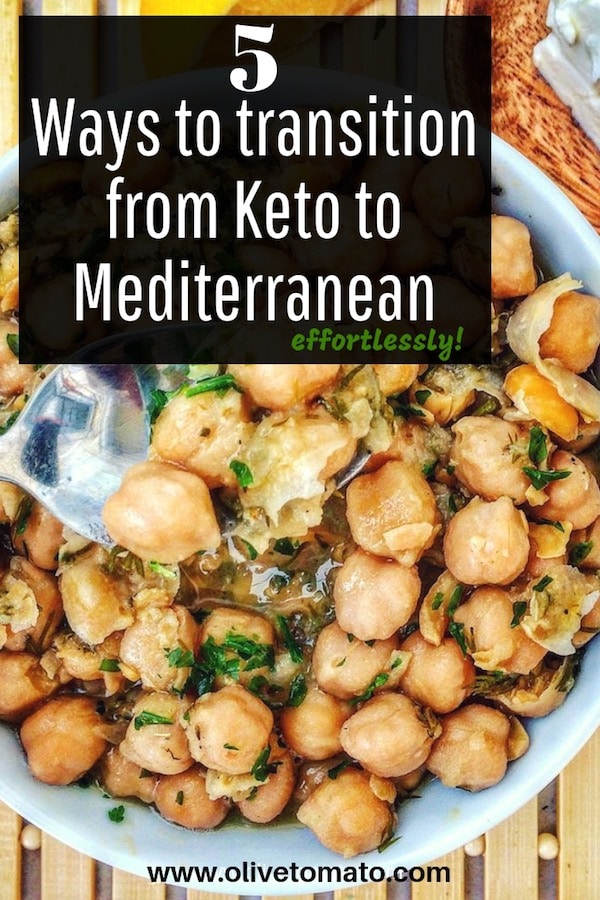What Is the Difference Between Keto and Mediterranean Diet

I have had several readers contact me about switching from a Keto diet to the Mediterranean diet. Let me start by saying that any diet for weight loss will have results if you follow it. Studies have shown that optimizing adherence is the most important factor for weight loss success. Having said that, when choosing a diet, an eating plan, a way of life- you really need to think about how realistic it is. Can you eat this way forever and be content? If the answer is no, then most likely that diet will be a failure.
Benefits of Switching from Keto Diet to a Mediterranean Diet
1. Easier to follow. The Mediterranean diet does not eliminate any food group.
2. Healthier and Evidence Based. I will not go into all the details here, but over 6000 studies support the Mediterranean Diet, the Keto Diet on the other hand has much less evidence. Actually, there is no comparison, the Mediterranean Diet has by far the most evidence than any other diet.
3. Long-term results. For the most part we know that a low carbohydrate diet may accelerate weight loss IN THE SHORT TERM, long term though there is no difference with a Mediterranean diet.
The real/authentic Mediterranean diet is not a high carbohydrate diet. It is not about pasta and bread but about a lot of vegetables and a lot of olive oil.
4. It's a Real Diet. The Mediterranean diet is a real way of eating that appeared in certain areas of the world, not a man-made diet.
5. What about diabetes? Repeatedly, overviews and meta-analysis of studies show that the Mediterranean diet not only can prevent the appearance of diabetes, but for those who have it, the diet can provide a good control of blood sugar. It is important to note that some of this protection can be attributed to the polyphenols (compounds with antioxidant activity found in plants) present in the diet.
The Authentic Mediterranean Diet is NOT a High Carbohydrate Diet
Before we start I need to clarify one issue or rather a misconception about the Mediterranean Diet that may be important to Keto followers. Contrary to what you may have heard, the real/authentic Mediterranean diet is not a high carbohydrate diet. It is not about pasta and bread, but about a lot of vegetables and a lot of olive oil. A typical menu on the Greek Diet which is considered the prototype of the Mediterranean diet, comes to about 40% fat, 40% carbohydrates and 20% protein. These are the findings from an analysis of macro- and micronutrients in a traditional Greek menu gathered by top Mediterranean Diet researcher Dr. Antonia Trichopoulou. The Greek diet is extremely rich in plant foods with small amounts of meat and the fat mainly comes from the generous use of extra virgin olive oil, resulting in moderate carbohydrate, moderate fat (not low fat) diet making it highly palatable.
So now that we have that out of the way, let's look at how you can transition to a Mediterranean Diet smoothly:
5 Ways To Transition From a Keto Diet to the Mediterranean Diet
1. Start with Keto Friendly Mediterranean Meals. If you look specifically at the Greek-Mediterranean diet you will find numerous foods that are quite keto friendly, this will get you used to consuming more vegetables and good fats. Some to try:
- Greek Green Beans
- Shrimp with Tomatoes and Feta
- Stuffed Eggplant with Tomato and Onion
- One Pot Greek Style Mushrooms and Leeks
- Mediterranean Garlic and Herb Crusted Roasted Sardines
- Roasted Zucchini and Tomatoes
- Traditional Greek Asparagus Omelet
2. Introduce Carbohydrates with Beans. Since you will be introducing carbohydrates in your diet again, the best way is to start eating beans. Bean or legumes combine, carbohydrates, protein, fiber and antioxidants and provide good blood sugar control. Start out with this lentil stew and these one pot black-eyed beans as they are better tolerated.
3. Always Pair Carbohydrates with Good fats and Protein. Don't start eating carbohydrates on their own as this may lead to blood sugar fluctuations as well as increased hunger, always pair them with some good extra virgin olive oil and plenty of vegetables as well as some protein such as tahini, peanut butter, cheese etc,
4. Reduce Meat Gradually. We know from the research that processed meats specifically, and red meat are associated with reduced longevity. In the Mediterranean diet red meat is consumed in small amounts about once a week. Try by reducing meat gradually: instead of 5-6 ounces reduce to 2 ounces. For more tips checkout this post for eating less meat in 5 steps.
5. Have Vegetable Based Meals. The Mediterranean diet has hundreds of recipes that consist of vegetables. These vegetable main course recipes are filling, healthy and often consist of mostly vegetables. They may be accompanied with a bit of cheese and if you wish a small piece of whole grain bread or barley rusks.
A Final Word
It can be scary to change your diet, especially if you feel it may cause you to gain weight. Take it slowly and adjust as needed. The most important part of this switch is not so much increasing your carbs, but reducing meat intake and saturated fats.
Good Luck!
Next Steps: Following A Complete Mediterranean Diet Plan
Once you are ready, head over to my Complete Guide to the Authentic Mediterranean Diet for more guidance including menu plans, tips, lists and more.
Selected References
- Systematic Review of the Mediterranean Diet for Long-Term Weight Loss. The American Journal of Medicine
- Is There an Optimal Diet for Weight Management and Metabolic Health? Gastroenterology
- Dietary Polyphenols, Mediterranean Diet, Prediabetes, and Type 2 Diabetes: A Narrative Review of the Evidence. Oxidative Medicine and Cellular Longevity
- Mediterranean diet and type 2 diabetes . Diabetes Metabolism Research and Review
- A journey into a Mediterranean diet and type 2 diabetes: a systematic review with meta-analyses. British Medical Journal Open
- Macro- and micronutrients in a traditional Greek menu. Forum of Nutrition
SAVE FOR LATER AND PIN IT

Photo by Elena Paravantes All Rights Reserved
Elena Paravantes, RDN is a Registered Dietitian Nutritionist, Writer and consultant specializing in the Mediterranean Diet and Cuisine. She has been active as a clinician, consultant and lecturer for 20 years, both in the U.S. and Greece. An expert on the Greek Mediterranean Diet, her interviews and articles have been published in many publications including CNN, U.S. News and World Report, Prevention, NPR, and Shape. Elena has collaborated with a number of organizations including Loyola University, Yale University, University of Missouri, Louisiana State University, and the American College of Greece.
What Is the Difference Between Keto and Mediterranean Diet
Source: https://www.olivetomato.com/how-to-switch-from-a-keto-diet-to-a-mediterranean-diet/
0 Response to "What Is the Difference Between Keto and Mediterranean Diet"
Post a Comment